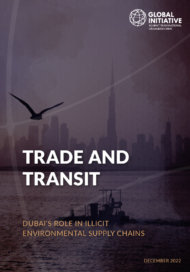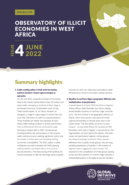Posted on 26 May 2017
Lebanon is historically notorious for its lack of metals and similar natural resources. This makes it even more astonishing that almost one quarter of Lebanese exports are constituted by a precious metal: gold. In 2016, non-monetary gold accounted for 23 percent of total exports, which were worth a little over $700 million according to customs data. Most of this gold was exported to South Africa.
Since mining of gold is non-existent in Lebanon, a second look at trade figures confirms that Beirut mostly acts as a transit point in the gold trade. It imports gold from Egypt, which is a smaller producer, from Switzerland, which is not on the list of the top 100 producing countries, and from several West African nations. Imports of non-monetary gold in 2016 reached nearly $1 billion, or about 5 percent of total imports.
According to the United Nations trade classifications, gold is considered monetary only when it is held in reserve assets by monetary authorities and related institutions. Non-monetary gold includes bullion, including coins, bars or ingots, and gold in powdered or other unwrought or semi-manufactured forms.
Although imports and exports of gold have a ballooning effect on Lebanese trade statistics, there is very little value-added or actual contribution of the gold trade to the economy. “Numbers are not important enough for gold to really contribute to the Lebanese economy. Even though jobs are created in the jewelry sector, margins are small,” explains Chris Boghos, who, along with his father, manages the family business Société Boghos that trades in gold both regionally and internationally.
Investigating gold as an important element of the Lebanese economy may thus be a fool’s errand, and any assumption that the high value of our gold exports translates into substantial contributions to our GDP would be misguided. The lure of gold nonetheless is not to be underestimated in the context of our economy. There are many questions about possible links between the gold trade – here as in many other countries – and concerns over organized crime. On the brighter side of this precious metal, local consumption of gold has productive contributions from jewelry production to investments.
A small node by global standards
Lebanon is the 27th largest buyer of gold in the world, behind regional hubs such as the UAE, Turkey, Jordan, Kuwait and Iran, while the biggest importers are Switzerland, China and India, according to the United Nations Conference on Trade and Development (UNCTAD). In terms of exports, Lebanon ranks 61st, far behind global producers such as South Africa, Russia, and Burkina Faso.
There are only a handful of refiners in Lebanon. According to one trader, these are not registered with the London Bullion Metal Association (LBMA), which lists bars and refineries that are acceptable in London and in other markets. For reasons that are unclear; gold from West Africa transits through Lebanon before being exported to be refined. Part of it is then re-imported and stamped with the name of LBMA-recognized refiners such as Valcambi, Metalor or Rand, confirming its value. Lebanese customs figures show that a little under $300 million of gold remains in the country. Some is bought by jewelers, some by investors.
As a prominent Lebanese trader puts it, gold has always been a safe haven in uncertain political times and has an added lure to local investors. “Do not forget we are in the Middle East. Especially in Lebanon, people have lost their money and savings many times. The political risks in the area make people purchase more gold. Even though Lebanon has a strong banking system, there is always more comfort in knowing your money has been invested in gold. It is a measure against inflation and is the real essence of having safe wealth,” says Boghos.
In 2016, 41 percent of gold imports came from the West African countries of Togo, Ghana, Benin, Guinea, Mali and Burkina Faso. When asked why gold transits through Lebanon rather than being exported directly to refineries in countries like Switzerland or South Africa, professionals are vague in their answers. “Historically, Lebanon has always played the role of a commercial intermediary between Europe and Arab countries, East and West,” says economist Elie Yachoui.
“We have kept a little of this role. Of course, it helps that we work with Lebanese gold exporters based in West Africa,” confirms a trader speaking on condition of anonymity. He adds, “The same trader usually has offices in different countries and can easily transfer the gold from country to country to centralize his exports from one place. This strategy is adopted because his gains are small, around 0.25 percent; he would make maybe $100 per bar that is worth $40,000.”
Whenever terms like gold mining and impoverished African nations appear next to each other, questions over illegal practices and money laundering tend to come up in the media and international civil society. Thus, it cannot be a surprise that gold trade from West African countries is a focus of investigations by a four-year-old network called The Global Initiative against Transnational Organized Crime, which works on human rights and development issues where organized crime is considered to be increasingly pertinent.
Marcena Hunter, a senior research analyst with The Global Initiative and one of the authors of a recent report on the financial flows linked to gold mining in Sierra Leone, confirms that practices are engineered to obfuscate where gold originates and could have some Lebanese involvement. For example, Lebanon imports from Togo and Benin, which are not significant gold producers, she says. “It is likely [that] a lot of the gold being exported out of Togo has been smuggled into the country. Togo itself produces very little gold. Previously, a lot [of] gold exported from Togo was thought to come from Ghana; currently a lot is thought to be smuggled from Burkina Faso,” she wrote in an email to Executive.
Another reason why West African gold transits first through Lebanon before being re-exported is that it becomes harder to trace, explains a second Lebanese trader, who also spoke with Executive on condition of anonymity. According to him, a lot of small refineries in Switzerland cannot work directly with many West African mines. “If an NGO has reported that a mine employs children, for example, Switzerland won’t trade with it. So maybe professionals are avoiding these regulations by using Lebanon as a transit point,” he says.
One of the examples of an effective naming and shaming is the report published in September 2015 by the Swiss NGO Public Eye, which accused a major Swiss refiner, Valcambi, of importing gold from a non-producing country, Togo. The gold was allegedly smuggled from Burkina Faso, where it is extracted by children and adults “under abysmal conditions.” In the same report, Public Eye mentions that Wafex, a trading company owned by the Lebanese Ammar family and based in Lomé, the Togolese capital, played a role in exporting this gold. Executive was unable to get in touch with Wafex on the phone or through social media to obtain their comment on this report.
After the report’s publication, Valcambi promptly issued a press release in which it said that all “refining activities regarding imports from Togo” were suspended pending an internal investigation. Last February, Valcambi announced that the investigation revealed no abnormalities. In an email to Executive, Valcambi referred to “stringent” Swiss laws against money laundering and the financing of terrorism and emphasized that monitoring of compliance with the law is done by the Organization for Economic Co-operation and Development (OECD). Valcambi claimed that large Swiss gold refiners have adopted OECD and LBMA due diligence recommendations to avoid getting entangled in child labor or human rights violations.
A variety of explanations
According to Lebanese customs, Switzerland is one of only two export destinations for non-monetary gold that transits through Lebanon. However, it is the smaller destination and seems to be becoming less important in this regard when compared with gold exports to South Africa. In relation to Lebanon, the role of this country grew from 71 percent of Lebanese gold exports in 2013 to 89 percent in 2016.
One explanation why South Africa’s share has been increasing, put forward by one of the anonymous trader mentioned above, is that South Africa’s anti-money laundering and anti-child labor measures are less strictly observed than in Switzerland. None of the South African refineries, such as Rand and Gauteng, nor the South African diamond and precious metals regulator responded to Executive’s questions on this matter by the time this article went to print. The Ministry of Finance in Lebanon, which supervises local customs authorities, also declined an interview.
However, this does not automatically imply that anything sinister is going on. One of the traders who spoke to Executive anonymously stressed that Lebanon implements strict due diligence rules, and that South Africa has similar regulations to Switzerland. He instead pointed to a commercial explanation. “The reason Lebanon exports more to South Africa is that it’s cheaper. The price difference for refining gold is approximately 5 to 10 cents on the ounce, which is important to us,” says the trader, whose company is a major player in the Lebanese gold market.
Lebanese customs figures show that in 2016, gold exports to South Africa tripled (up 226 percent) in terms of value in comparison to 2015. “We decreased our commissions, so we are able to increase our market share. People who were selling through Dubai realized we had better rates,” disclosed the trader, without giving further details on prices. He maintained that his Lebanese company offers other advantages to sellers. “We pay the gold trader on the spot, as we trust our clients. However, most buyers wait until the gold is refined to know how much it is worth, which can take a few days.”
Another shift in trade could be related to taxes. As Boghos points out, Dubai imposed a 5 percent tax on imported gold jewelry in early 2017, and this could have played a role in a recent increase in the amount of gold transiting through Beirut.
Jewelry has its own demand
What complicates the picture further is that Lebanon doesn’t only import gold from West Africa or newly refined gold from other countries; one important component of imports is scrap gold. Jewelers acquire scrap gold from old jewelry and other golden items for reuse in new pieces. Jewelry is Lebanon’s number one manufactured export, with over 1,000 gold workshops and small factories that for the most part export to the Gulf, Boghos says.
Trade sources for scrap gold can vary according to geopolitical circumstances, as was the case for Egypt last year. In 2016, Lebanon imported 30 percent of its gold from Egypt, a relatively new trend. In 2013, only 9 percent of gold came from there. “Following the recent political and financial instability that Egypt has witnessed, people started selling their jewelry, which is then melted, for extra cash,” explains one trader.
According to the same trader, unregistered scrap gold is also smuggled into Lebanon from Syria, presumably for tax avoidance or even attempts to circumvent sanctions against the regime in Damascus. “According to Lebanese law, you are supposed to declare any gold that you import or export, but no one will notice 5 or 6 kilos of gold bars in a passenger’s pocket. There is no tax on raw gold, however, which means that big quantities are rarely undeclared. Jewelry has a higher chance of being smuggled, as it is taxed between 5 and 10 percent,” the trader explains.
As indicated by the import and export data, gold consumption in Lebanon can be estimated at a little under $300 million for 2016. In constant price, taking December 2015 prices as base, local consumption went up 10 percent between 2015 and 2016. According to a source, this increase in consumption is linked to the fact that Lebanon slowly started moving toward more transparent banking when it promised, back in May 2016, to adopt the OECD’s Common Reporting Standard (CRS) starting in 2018.
The CRS facilitates – supposedly automated – financial information exchange between countries that is relevant for taxation in a similar way to the United States’ Foreign Account Tax Compliance Act (FATCA). “People who do not want their banking information revealed started buying gold instead,” the source adds.
Even without the added potential usage as means to avoid taxes, it is no simple task to assess reasons for gold demand and movements in the trade of gold. In the turbulent recent years of the global economy, this precious metal has seen prices fluctuate greatly – on a five-year trajectory from April 2013 to April 2017 one can find a high of almost $1,800 per ounce and a low of little more than $1,050, as well as a price near $1,300 in April 2017. Demand also reflects what investment recommendations are in vogue at any given time and how asset allocations are distributed between gold and other securities.
According to Boghos, another factor driving up local gold demand was a drop in prices late last year. “In November and December 2016, we saw prices go from $1.3 the ounce to $1.128 per ounce. As prices were cheap, demand quadrupled. Lots of this gold will be saved, and lots will be sold again to make a margin. It will then be recast and transformed into a new bullion or jewelry,” he says.
This gold might find its way into many different hands. “Gold is bought by households as gifts for newborns, baptisms, communions, weddings and divorce, engagements or savings. Companies also buy gold as bonuses for their employees. Like banks, they also diversify their investments by buying gold,” Boghos adds.
However, buying gold as an asset only represents about a quarter of local consumption, reckons one of the two traders questioned by Executive. “Out of the $300 million that is bought in Lebanon, we cannot know what amount stays here. A lot of expatriates that come to Lebanon for the summer buy gold jewelry which then exits the country unregistered,” he explains. As for now, he expects prices of gold to go up because of rising geopolitical instability; an opinion which Boghos shares, “In this case, there will be even more demand and consumption,” concludes Boghos.
This article, written by Sunniva Rose, first appeared in Executive Magazine (



